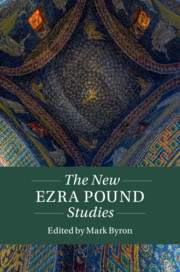Book contents
- The New Ezra Pound Studies
- Twenty-First-Century Critical Revisions
- The New Ezra Pound Studies
- Copyright page
- Contents
- Notes on Contributors
- Key to Abbreviations
- Editor’s Introduction
- Part I Pound’s Texts
- Part II Ezra Pound and Asia
- Chapter 8 Pound’s Representation of the Chinese Frontiers
- Chapter 9 ‘A Treasure Like Nothing We Have in the Occident’
- Chapter 10 Ezra Pound and Chinese Poetry
- Part III Culture and Politics
- Index
- References
Chapter 8 - Pound’s Representation of the Chinese Frontiers
From the War Zone to the Green World
from Part II - Ezra Pound and Asia
Published online by Cambridge University Press: 17 October 2019
- The New Ezra Pound Studies
- Twenty-First-Century Critical Revisions
- The New Ezra Pound Studies
- Copyright page
- Contents
- Notes on Contributors
- Key to Abbreviations
- Editor’s Introduction
- Part I Pound’s Texts
- Part II Ezra Pound and Asia
- Chapter 8 Pound’s Representation of the Chinese Frontiers
- Chapter 9 ‘A Treasure Like Nothing We Have in the Occident’
- Chapter 10 Ezra Pound and Chinese Poetry
- Part III Culture and Politics
- Index
- References
Summary
In his London years, Pound had ambivalent feelings about the marginal status of the country of his origin, the United States. On the one hand, he had a strong desire to position himself in the centre of Western civilization; on the other hand, he could not help being conscious of his origin in the margin – the frontier – of that civilization. For example, at the beginning of ‘What I Feel about Walt Whitman,’ published in 1909, he wrote, ‘From this side of Atlantic I am for the first time able to read Whitman, and from the vantage of my education and … my world citizenship’ (SP 145), but in his poem ‘A Pact’, published in 1916, he addressed to his imaginary Whitman, ‘We have one sap and one root – / Let there be commerce between us’ (PT 269).
Keywords
- Type
- Chapter
- Information
- The New Ezra Pound Studies , pp. 127 - 140Publisher: Cambridge University PressPrint publication year: 2019



